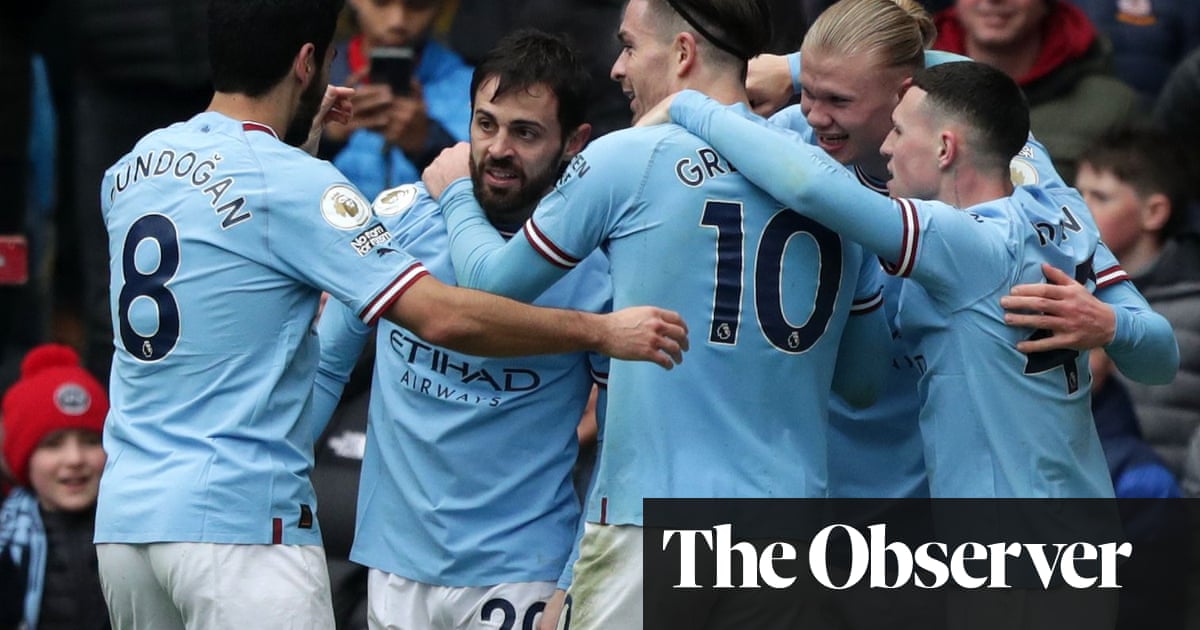
Farewell then, Phil Neville. Again. Nine months after he agreed to leave his position as manager of the England women’s team, one of the country’s longest goodbyes finally nears completion.
Contact has been made with Inter Miami, the now-managerless MLS club part-owned by his former teammate David Beckham, and after three fidgety years the end of the Neville era finally appears to be upon us.
If he does take the job, then perhaps it is an appropriate moment to reflect on Neville’s journey in coaching, a trajectory that at the relatively young age of 43 has already landed him a number of coveted positions. England Under-21s, Manchester United, Valencia, Salford City, England women – and now, it seems, Miami. Just how does he keep doing it?
Clearly, given his conspicuous lack of success in most of these roles, the only possible conclusion is that Neville must be one hell of an interviewee – the sort of guy that walks into a room and just charms people. Of course, it helps when the people you are trying to charm are old friends like Beckham. Or former managers such as David Moyes at United. Or your brother Gary at Valencia. Or yourself, as co-owner of Salford. Or when you are offered the job without even applying, as with England.
The defining motif of Neville’s coaching career to date is a series of doors being held open for him: a path that ironically enough would not exist for a woman of his equivalent talent. Still, in his inimitable capacity to keep falling into ever more lucrative jobs, Neville has demonstrated a defiance of meritocracy that will reward him well beyond football. Expect him to turn up as foreign secretary in about a decade.
And so to Neville’s tenure itself: a reign of two halves, characterised by 18 months of genuine progress and 18 months of flaky atrophy, hinging around that fateful World Cup semi-final against the USA in Lyon in July 2019. To this day England will mourn Steph Houghton’s missed penalty and the marginal VAR call that denied Ellen White the chance to equalise at 2-2.
To run the world’s best team so close was a credit to the entire squad, as well as the sweeping culture changes that Neville had instituted. A progressive 4-2-3-1 system was embedded and drilled, talent identified and integrated, young players such as Keira Walsh and Beth Mead given their chance. And though questions remained over Neville’s selections, tactics and game management, France 2019 had the feeling of a springboard, a platform from which to launch a spirited campaign on home soil at Euro 2021.
At which point: enter the drift. Three wins in 10 games since the 2019 World Cup only tells a partial story, given that most were friendlies with an experimental feel. But even accounting for the cold stasis of the pandemic, a sensation of waste and regression surrounds this England team: one that for all its youth and ability still feels less than the sum of its parts. The midfield remains hollow, leaden, lacking in craft. The goalkeeping situation remains unresolved. The lack of a distinct identity or playing pattern will become cripplingly apparent against elite opposition.
And on some level it is hard not to connect this with Neville’s apparent loss of interest in the job, one that has coincided with increasingly frequent appearances on Match of the Day to talk about men’s football. Not having any actual games to coach clearly hasn’t helped. But the announcement of Inter Miami’s interest in Neville – and vice versa, by all accounts – is merely the culmination of a process that has been in train ever since the announcement of his departure in April.
In hindsight, Neville should probably have gone then. Perhaps even earlier, given the mess his departure has created. A successor, Sarina Wiegman – who did apply for the job – has already been identified. Neville’s insistence that he still wants to lead Team GB into this summer’s Olympics rings hollow now we know that he has been casting around for alternative work. This isn’t just having your cake and eating it. It’s having your cake, eating it, and then insisting on more cake while you eye up the plate of profiteroles on the next table.
Let’s remind ourselves that back in 2018, Neville was unequivocal about his commitment to women’s football when he took the job. He denied that this was simply a stepping stone to a first managerial role in the men’s game. Even so, the clues were there when he described the move as “the right development path for me”. And of course it was. The kudos. The exposure. The profile. The instant wave of goodwill. The relative lack of tribalism and scrutiny. It was a dream opening.
And of course to a large extent management is about self-projection: about picking your moment, about choosing the right wave to ride at the right time. As he continues to negotiate a move to Inter Miami – a club that doesn’t even have a women’s team – we can conclude with some certainty that Phil Neville got what he wanted out of women’s football. Whether women’s football got what it wanted out of Phil Neville is a far thornier question.












